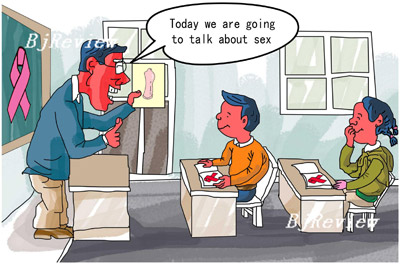
For many years after the first AIDS case was discovered in New York in 1981, the Chinese believed that AIDS was something that would never happen in their country. However, 26 years after that first incident, HIV/AIDS prevention is now one of the biggest challenges China is facing. Prevention and control campaigns that had previously focused on sex sellers and buyers are now targeting other high-risk groups such as drug addicts, homosexuals and migrant workers. And in a very progressive move, HIV/AIDS education is now being taught to Chinese children.
A textbook dealing with HIV/AIDS prevention is now used in 80 percent of Beijing's middle schools, covering such topics as abstinence from premarital sex, rejection of online relationships and proper use of condoms.
"Unprotected sex" is listed as an important HIV/AIDS transmission channel. The textbook contains the ABC approach to HIV/AIDS prevention that is widely adopted worldwide, namely, abstinence, or delayed sexual encounters among youth; be faithful, which means avoiding sexual intercourse other than with a mutually faithful uninfected partner, and condomise, namely, correct and consistent use of condoms.
In China, discussing sex has traditionally been, and in many quarters still is, considered taboo. Therefore, the textbook dealing with HIV/AIDS prevention has inevitably sparked debates nationwide.
Some believe that when it comes to sex, honesty pays, and it's better to inform young people of the realities than embark on a cover-up strategy. They strengthen their argument by referring to the fact that official statistics show that by the end of 2006, there were already 650,000 HIV/AIDS carriers or patients in China, proof enough that AIDS was here and now, and the best ammunition children could have is knowledge about the disease and how to prevent it.
Opponents of sex education argue that "how to use a condom" instructions in a textbook may send the wrong message to students, who may deduce that being active sexually is now condoned by schools because of the sex education courses. This could lead to sexual experimentation at an earlier age, and besides, say detractors, condoms are not as reliable as originally thought. According to the Department of Health and Human Services of the United States, condoms will help to reduce the risk of a sexually transmitted disease like gonorrhea being passed from female to male by 49-100 percent, but not when the male is already infected with gonorrhea. As far as HIV/AIDS is concerned, condoms can reduce the risk by 85 percent, but the 15 percent possibility of failure in this case means the equivalent of them being 100 percent unsafe.
Sex education ok for young students
Xia Yucai (hlj.rednet.com): Those who believe compulsory HIV/AIDS prevention, such as learning how to use a condom, will prompt young students to have sex, worry too much. They focus too much on the sex itself and neglect the role of sexual morals.
Children are always curious about the unknown, so whether sex education appears in textbooks or not, they will find out on their own. Nowadays, condoms are no longer strange things to the young and it's better to bring them out into the open than to hide them. Children who are sex savvy will not necessarily have sex. Moreover, in most cases, when the truth is told, even the most mysterious things lose their appeal, which is the same with sex.
The key does not lie in condoms but whether young students can have sex. Without being aware of sexual morality, condom instructions and knowledge of contraception will be a mistake, ending up in failure.
Zhou Tianhua (China Youth Daily): With the development of modern civilization, people now understand that sex is natural and a part of being human. We do not support the inhuman abstinence that prevailed in the feudal society, but are also opposed to sexual promiscuity. The young students are not mature either psychologically or physically, so it's important to warn them of the harm of premarital sex. Besides, to possess correct values on love and the right sense of social responsibility is the basic moral quality that a harmonious society demands of its citizens.
|
